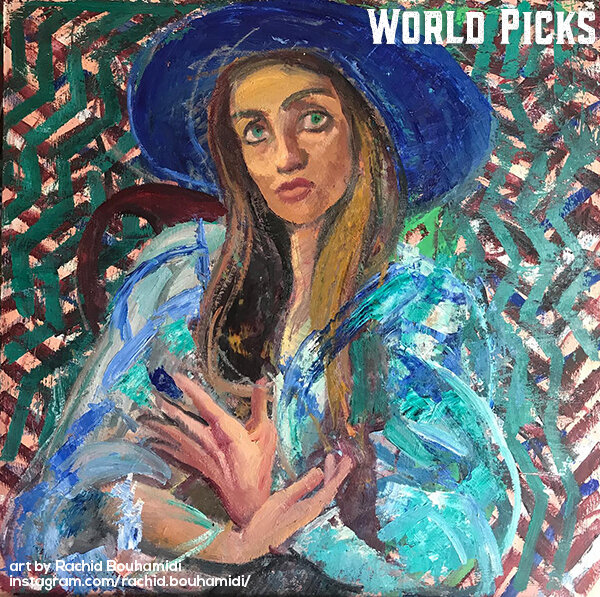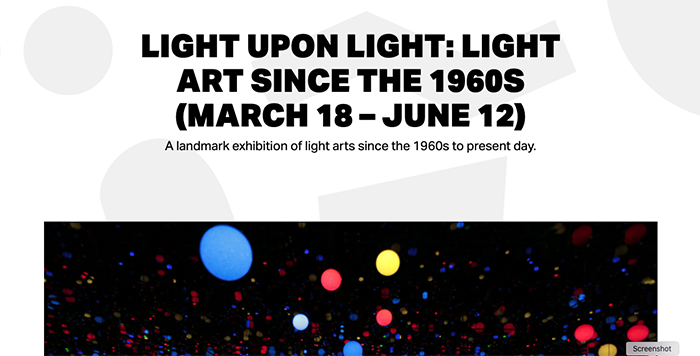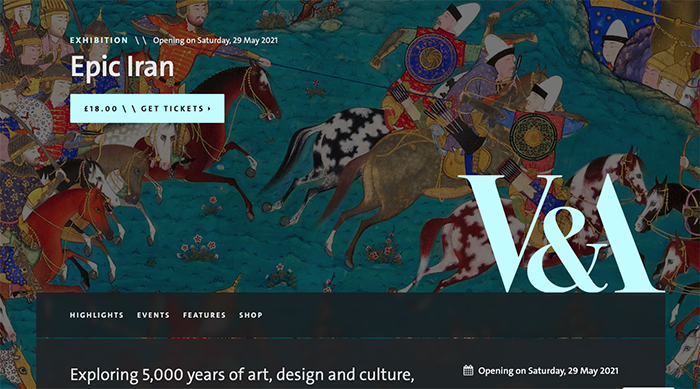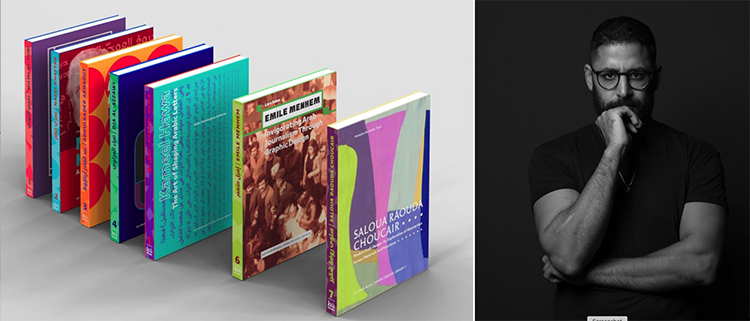Got an event, book, film, conference or anything else you’d like to recommend? Drop us a line.
All listings are online, unless otherwise noted.
19 April (MON) 23:59 BST | 18:59 EST | 15:59 PST | ON MARSM Documentary “Slingshot Hip Hop” Directed by Jacqueline Reem Salloum featuring the pioneers of Palestinian hip hop
Catch this archival film before it’s too late. Slingshot Hip Hop (2008), directed by Jacqueline Reem Salloum, charts the birth of Palestinian hip hop inside Israel and the Occupied Territories. At the beginning of the film, the group DAM, who recorded the catchy political anthem “Meen Erhabi” (Who’s the Terrorist?), has a photo op with Public Enemy’s Chuck D. The trio from Lydda, plays its first illegal gig across the Green Line in the Deheishe Refugee Camp, and helps two young residents there, Bilal and Rami, write and perform a rap about a martyred friend. A few months later DAM phones Bilal in prison, after he and Rami were arrested for throwing stones. The power of rap to transform lives clearly didn’t worked for them; but for others it remains a powerful impetus, despite seemingly insurmountable difficulties. Talented young female vocalist Abeer Alzinaty continues recording despite being not being able to sing onstage because of the threats her parents received. Extended family members objected to a female cousin performing in public.
Rap is the music of lived experience and the politics of occupation are at the core of Palestinian rhymes. Rappers reveal the limits on their freedom of movement when the camera follows them on walks through their neighborhoods, where Arab schools and libraries are turned into Israeli police stations. In Gaza, Mohammed al-Farra and members of the rap group PR spend endless hours trying to get through checkpoints. Mahmoud Shalabi strolls the ancient, covered streets of Akka. But once he goes to Tel Aviv and is overheard speaking Arabic, he is stopped and questioned by the Israeli police. These young articulate voices from ten years ago make you wonder where they are now.
Jacqueline Reem Salloum directed Planet of the Arabs in 2005. She is an artist, and her most recent work for A Symbol of Lost Homeland celebrates the life and work of Tawfiq Canaan, the Palestinian physician, oral historian and collector.
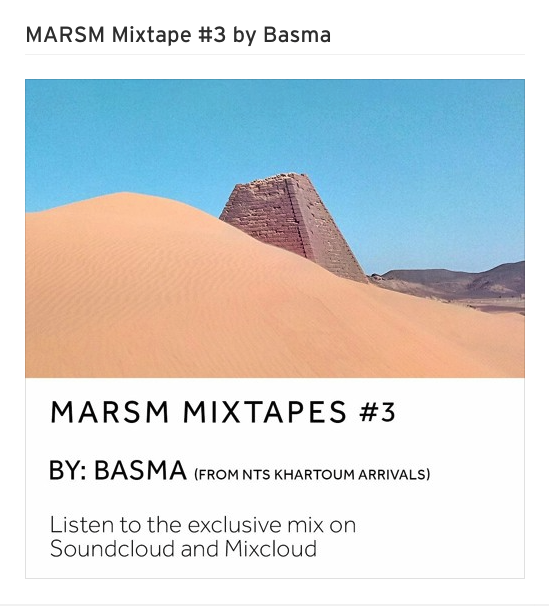
MARSM MIXTAPE #3 BY BASMA
Showcasing an eclectic selection of music arranged in sequences of unforeseen sonic analogies, this collective mix was put together by Basma, who is of Nubian Sudanese descent and is based in London. She hosts the Khartoum Arrivals show on NTS Radio where she likes to tap into memories tied to old Sudanese love songs.
About the mix: This mix features popular and folk music from around Sudan, with sounds from Halfa, Kassala, Blue Nile, Darfur and Khartoum.
MARSM’s Monthly Mixtapes bring a curated selection of music from some of the most influential audiophiles, collectives, DJs, musicians, and producers of the Arabic-speaking world. Tune in for some rare musical gems, masterfully compiled for you into one continuous play.
Podcast SEARCHING FOR MINARETS IN THE MOUNTAINS WITH THARIK HUSSAIN, from The Arts in Isolation series at Asia House’s Converging Paths 2021
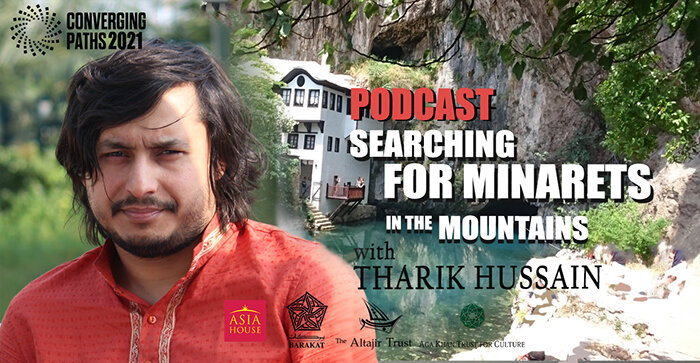
In 2019, Oxford University requested that its history dons and students join the British Muslim travel writer and broadcaster Tharik Hussain on Britain’s Muslim Heritage Trail No. 2, a walk and lecture he gives in Brookwood Cemetery, in Surrey. It was the final resting place of several kings of Yemen, a Sultan of Oman, the last Ottoman princess, along with famous English translators of the Quran and British royals who converted to Islam. Hussain’s historic trails, in the words of the university’s letter, “have the capacity to decolonize the mainstream historical narrative of Britain.”
As Hussain explains to Seif El Rashidi from the Barakat Trust, “No one was telling me these stories, as a Muslim in Europe, no one was telling me my stories.”
In the tradition of Ibn Battuta, Hussain’s latest book Minarets in the Mountains: A Journey through Muslim Europe follows in the footsteps of seventeenth century Ottoman explorer and popular writer Evliya Çelebi. Hussain traveled through such countries as Serbia and Bosnia-Herzegovina, among others, with his wife and young daughter. El Rashidi is an architectural historian, with an interest in cultural preservation. He and Hussain explore the differences between 600 year-old Islamic communities in the former Yugoslavia, which survived brutal war, and Britain’s own multiethnic Islamic heritage.
UNTIL SATURDAY, MAY 1, EXHIBITION mosaic فسيفساء AT reACT at P21 GALLERY
“My answer to this question can be best illustrated with another story…
The Orient. The Middle East. The Arab World.
First-Generation. Third Culture. Immigrant.
Terrorists. Refugees. Veiled women and men with long beards.
What does ‘Arab’ bring to mind …”
Fast paced, surprising and posing more questions than answers, the short art film mosaic فسيفساء combines interviews, crowd-sourced imagery and verbatim audio with archival black-and-white twentieth-century colonialist footage. In a rich barrage of words, voices and sometimes self-shot footage, young people from SWANA+ (South-West Asia and North Africa), at home and in the diaspora, tell of their different experiences, reactions and explorations of identity – whether through gender and sexuality or food and language. The use of the quick cut and knowing subtitles in English and Arabic adds another layer of visual criticism to the film, and shows how certain images and musical moods can reinforce stereotypes.
Featuring original sound by Sophie K. and visual design by Jeremy Rieder, mosaic فسيفساء was co-directed by Layla Madanat, an Arab-British interdisciplinary artist and social justice activist, and Eleanor Nawal, an British-Egyptian actor and writer. The exhibition, curated by Mishelle Brito, is part of P21’s reACT series, which promotes and supports emerging and student artists with work dedicated to or inspired by the Middle East and the Arab world.
Until June 12, Exhibition Light Upon Light: Light Art Since The 1960s at the King Abdullah Financial District Conference Center, Al Aqiq, Riyadh 13511, Saudi Arabia
While in many international cities, museums are closed under lockdown rules, the exhibition Light upon Light is open to the public and online. Thirty international artists play with, reflect and generate light in immersive and interactive installation, video and sculpture. The Japanese artist Yayoi Kusama, who loves polka dots, dazzles with Infinity Mirror Room – Brilliance of Souls, 2014. For the installation Mitochondria: Powerhouses, 2021, Saudi physician and artist Ahmed Mater uses a Tesla resonance transformer coil and creates a flow of high voltage and alternating current electrical lightning strikes, which melt sand and form glass sculpture.
Another Saudi artist, Manal Al Dowayan, takes a less visceral approach with the words in poetic light: Nostalgia Takes Us to the Sea But Desire Keep Us from the Shore, 2010. Al Dowayan was in conversation with British Museum curator Venetia Porter and artists Newsha Tavakolian, from Iran, and Laura Boushnak, from Palestine, and spoke about the fast past of change taking place in her country, an event available on YouTube.
Light upon Light was curated by Susan Davidson, formerly from the Guggenheim Museum and Saudi curator Raneem Zaki Farsi. It is the first edition of Noor Riyadh, the first city-wide public art program; and Art Riyadh, a national public art initiative, new projects that coincide with Vision 2030 to reduce Saudi Arabia’s dependency on oil and diversify its economy through tourism and culture. Despite the religious connotations of the exhibition’s title Nûr ‘alâ Nûr, in Arabic, the high-end art project has been criticized for “art-washing” the country’s dire human rights record.
Through April, Exhibition Muslims With Christians and Jews; Covenants and Coexistence at the International Museum of Muslim Cultures

Celebrating Islamic Heritage Month, an annual event in Jackson, Mississippi since 2016, the Muslims with Christians and Jews: Covenants and Coexistence exhibition at the International Museum of Muslim Cultures (IMMC) explores the historical and current relationship between Islam and America. Through historical covenants and treaties the Prophet Muhammad made with Christians and Jews living in seventh century Medina, ideas of coexistence and governance influenced America’s founding fathers, through what they knew and said about Islam. Curated by Lina Ali, Jeanne Luckett and Okolo Rashid, Muslims with Christians and Jews also features the voices of African American Muslims and connects that early struggle for freedom in America to today’s Islamophobia and the ongoing fight in the country for civil and human rights.
Opening Late Spring Until September 12, 2021, Exhibition EPIC IRAN Epic Iran at the Victoria & Albert Museum
The Epic Iran exhibition explores 5,000 years of Persian art, design and culture though sculpture, ceramics and carpets, textiles, photography and film. The historic objects and artworks reflect the Iran’s vibrant historic culture, architectural splendors, the abundance of myth, poetry and tradition, and the evolving, self-renewing art and culture of today. From the Cyrus Cylinder and intricate illuminated manuscripts of the Shahnameh to ten-meter-long paintings of Isfahan tile work, Shirin Neshat’s two-screen video installation Turbulent, and Shirin Aliabadi’s striking photograph of a young woman chewing bubblegum, the exhibition presents an overarching narrative of Iran from 3000 bc.
It covers: the Land of Iran; Emerging Iran starting in 3200 bc when writing first occurred; The Persian Empire and the Achaemenid period; Last of the Ancient Empires and Alexander the Great; the Book of Kings, on the Shahnameh; Change of Faith, after the Arab conquest in the mid-seventh century ad; Literary Excellence on poetry, patronage and art; The Old and the New of the Qajar dynasty; and, finally, Modern and Contemporary Iran, which charts mid-century modernisms to the present day, with Farhad Moshiri and Shadi Ghadirian, among other artists.
Epic Iran was organized by the V&A with the Iran Heritage Foundation, in association with the Sarikhani Collection. Due to covid restrictions, the exhibition will open in late spring.
RSVP here.
FRIDAY, MAY 7, 2021 12:00 pm EST | 17:00 pm BST | 9:00 am PST, Conversation on the Poetics of Exile: NYC, Tehran, Paris
in The Literatures of Annihilation, Exile & Resistance series at the University of Notre Dame
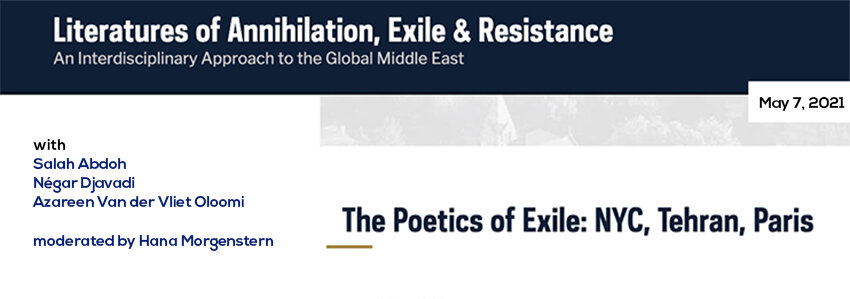 Four writers discuss the poetics of dislocation and exile from different places and points of view. Négar Djavadi was born in Iran in 1969 to a family of intellectuals opposed to the Shah and then later to Khomeini. Having escaped the country by crossing the mountains of Kurdistan on horseback with her mother and sister, she arrived in France at the age of eleven. She wrote the debut novel Disoriental and is a screenwriter in Paris.
Four writers discuss the poetics of dislocation and exile from different places and points of view. Négar Djavadi was born in Iran in 1969 to a family of intellectuals opposed to the Shah and then later to Khomeini. Having escaped the country by crossing the mountains of Kurdistan on horseback with her mother and sister, she arrived in France at the age of eleven. She wrote the debut novel Disoriental and is a screenwriter in Paris.
Salar Abdoh, also born in Iran, now lives between Tehran and New York City. Abdoh teaches in the MFA program at the City College of New York and is the recipient of the NYFA Prize and the National Endowment for the Arts award. He has authored four novels, including the most recent, Out of Mesopotamia. Moderating the conversation will be writer and translator Hana Morgenstern, university lecturer in Postcolonial and Middle East Literature at Cambridge University, a fellow at Newnham College and co-director of the Documents of the Arab Left and the Revolutionary Papers projects.
Asking the questions with her is Azareen Van der Vliet Oloomi, director of creative writing at the University of Notre Dame and author of Call Me Zebra, the winner of the 2019 PEN/Faulkner Award, and the John Gardner Fiction Award. She was also long-listed for the PEN/Open Book Award. Van der Vliet Oloomi is the director of Notre Dame’s MFA Creative Writing Program and a Fellow of the Kroc Institute for International Peace Studies. Her novel Savage Tongues will be published later this year.
The event is organised by Literatures of Annihilation, Exile & Resistance: An Interdisciplinary Approach to the Global Middle East and North Africa, and is a bi-annual symposium and lecture series. It focuses on the study of literatures that have been shaped by histories of territorial and linguistic politics, colonialism, military domination and gross human rights violations. The initiative grapples with the constructed nature of history; reimagines American and global alternative narratives from the position of suppressed voices; and examines how minoritized writers and scholars have historically innovated literary production and theory in the process of responding to systemic violence.
RVSP here.
APRIL–JUNE 2021, Online series of talks HISTORIES and ARCHIVES OF ARABIC PUBLISHING, from the British Library and the Murray Edwards College, University of Cambridge
These lectures and conversations will explore publishing practices in Arabic as a site for unfolding intellectual networks, artistic practices and political imaginaries from the 1960s until the present. Leading practitioners in the field will examine past and present practices of publishing in Arabic, and address questions of scale of operations and reach; mediums and formats; audience and language; and the social and political context. The series, which also considers contemporary collecting practices of publishing archives, highlights collections’ capacity to foreground publishing archives not merely as a signifier of other historical processes but as a historical process in their own right.
The first session, on Tues April 27 at 17:00 PM BST | 12:00 PM EST | 9 AM PST (register via Zoom), brings together artists and curators Ala Younis and Maha Mamoun, in conversation with art historian Hala Auji, to talk about Kayfa ta: On Shapeshifting Texts and Other Publishing Tactics. In 2012, Younis and Mamoun founded Kayfa ta, an independent publishing initiative that emerged from a need to extend beyond the limited readership and distribution of non-mainstream alternative books.
The second session, on Tues 11 May at 17:00 PM BST | 12:00 PM EST | 9 AM PST (register via Zoom), will be given by Huda Smitshuijzen AbiFarès, founding director of the Khatt Foundation and Khatt Books publishers. She will speak on The Arabic Design Library: Alternative Narratives from the Arab World, and the importance of documenting and presenting an alternative design history from parts of the world that are rarely covered in main-stream design publications. She will be joined by Cairo-based multidisciplinary designer, researcher and writer Moe Elhosseiny, who will discuss the Arabic Cover Design Archive: Digital Archives as Design Activism.
For the third session, on Tues 25 May, at 17:00 PM BST | 12:00 PM EST | 9 AM PST (register via Zoom), Zeina Maasri, senior lecturer in the School of Humanities at the University of Brighton, will speak alongside Berlin-based artist collective Fehras Publishing Practices (Sami Rustom, Omar Nicolas and Kenan Darwich) about their respective projects on Arabic publishing during the Cold War.
Histories and Archives of Arabic Publishing is co-curated and convened by Hana Sleiman, Research Fellow in History at Murray Edwards College, University of Cambridge, and Daniel Lowe, Curator of Arabic Collections at the British Library, in partnership with the Delfina Foundation, Murray Edwards College, University of Cambridge, and the Middle East History Group, Faculty of History, University of Cambridge.
UNTIL JUNE 6, 2021
EXHIBITION SUGAR ROUTES I, 2013, BY ZINEB SEDIRA, AT LIVERPOOL BIENNIAL THE STOMACH AND THE PORT
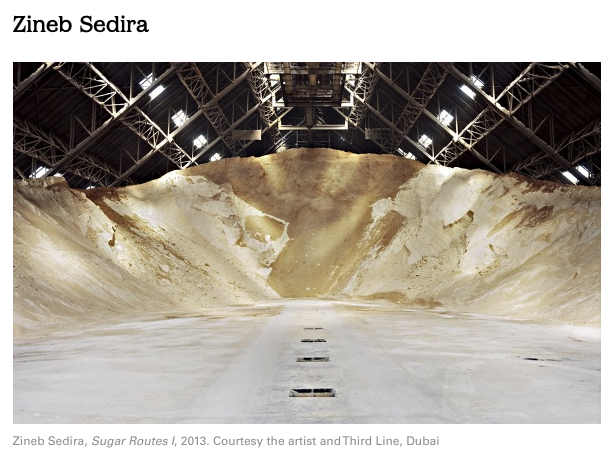 The exhibition Sugar Routes by Algerian-origin artist Zineb Sedira highlights the sweetness of sugar versus the bitterness of the story behind its trade and consumption. Photographs of sugar from different parts of the world housed in a modern warehouse in Marseille recount the history of transoceanic human migration, the triangular trade routes of the eighteenth and nineteenth centuries and the continued trade of sugar across the Atlantic for mass consumption in a contemporary context. The mountainous piles present a landscape of extraction where multiple geographies convene and merge with one another, with the warehouse as an in-between space of encounter before the sugar is processed for consumption. A sculpture of an anchor made from cane sugar found in the French silo acts as a metaphor for migration and diaspora.
The exhibition Sugar Routes by Algerian-origin artist Zineb Sedira highlights the sweetness of sugar versus the bitterness of the story behind its trade and consumption. Photographs of sugar from different parts of the world housed in a modern warehouse in Marseille recount the history of transoceanic human migration, the triangular trade routes of the eighteenth and nineteenth centuries and the continued trade of sugar across the Atlantic for mass consumption in a contemporary context. The mountainous piles present a landscape of extraction where multiple geographies convene and merge with one another, with the warehouse as an in-between space of encounter before the sugar is processed for consumption. A sculpture of an anchor made from cane sugar found in the French silo acts as a metaphor for migration and diaspora.
Sugar Routes, originally commissioned by Marseille Provence 2013, European Capital of Culture and the Port of Marseille, is part of Liverpool Biennial 2021, which takes over the city’s public spaces, historic sites and art galleries. Its 11th edition, The Stomach and the Port, curated by Manuela Moscoso, investigates notions of the body and ways of connecting with the world.
THURSDAY, APRIL 29, 2021 FROM 18:00 TO 19:30 PM BST | 13:00 TO 14:30 EST | 10 AM PST Discussion on We Wrote in Symbols: Love and Lust by Arab Women Writers, at the Arab British Centre with Saqi Books, with Selma Dabbagh, Lisa Luxx, Saieda Rouass, Yasmine Seale and Hanan Al-Shaykh
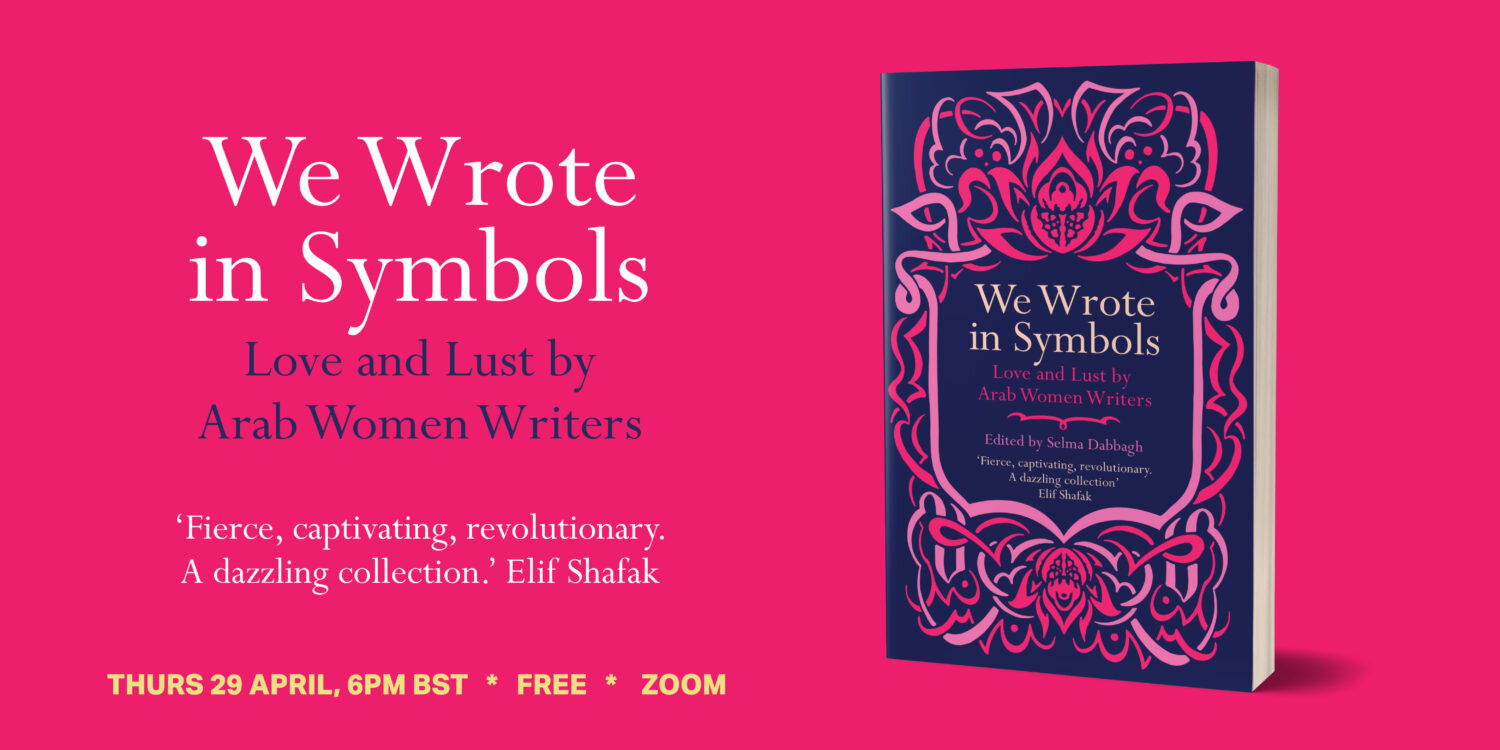 The anthology We Wrote in Symbols celebrates the works of 75 women writers of Arab heritage who articulate love and lust with artistry and skill. From a masked rendezvous in a circus, to meetings in underground bars and unmade beds, there is no such thing as a typical sexual encounter. Editor Selma Dabbagh, discusses the book with four contributors: lisa luxx, queer poet, essayist and activist of British and Syrian heritage, whose debut poetry collection Fetch Your Mother’s Heart will be released by Out-Spoken Press in May; Saeida Rouass, a novelist from London and author of Eighteen Days of Spring in Winter and Assembly of the Dead; Yasmine Seale, a British-Syrian writer, translator and author of Aladdin: A New Translation and the forthcoming Agitated Air: Poems after Ibn Arabi; and Hanan al-Shaykh, the celebrated novelist, playwright and journalist from Lebanon, whose books include I Sweep the Sun Off Rooftops and The Occasional Virgin. Dabbagh is a British-Palestinian writer whose debut novel Out of It (Bloomsbury) was the 2011 Guardian Book of the Year. She has also worked as a writer for feature films and radio plays and is a writer for feature films and radio plays.
The anthology We Wrote in Symbols celebrates the works of 75 women writers of Arab heritage who articulate love and lust with artistry and skill. From a masked rendezvous in a circus, to meetings in underground bars and unmade beds, there is no such thing as a typical sexual encounter. Editor Selma Dabbagh, discusses the book with four contributors: lisa luxx, queer poet, essayist and activist of British and Syrian heritage, whose debut poetry collection Fetch Your Mother’s Heart will be released by Out-Spoken Press in May; Saeida Rouass, a novelist from London and author of Eighteen Days of Spring in Winter and Assembly of the Dead; Yasmine Seale, a British-Syrian writer, translator and author of Aladdin: A New Translation and the forthcoming Agitated Air: Poems after Ibn Arabi; and Hanan al-Shaykh, the celebrated novelist, playwright and journalist from Lebanon, whose books include I Sweep the Sun Off Rooftops and The Occasional Virgin. Dabbagh is a British-Palestinian writer whose debut novel Out of It (Bloomsbury) was the 2011 Guardian Book of the Year. She has also worked as a writer for feature films and radio plays and is a writer for feature films and radio plays.



